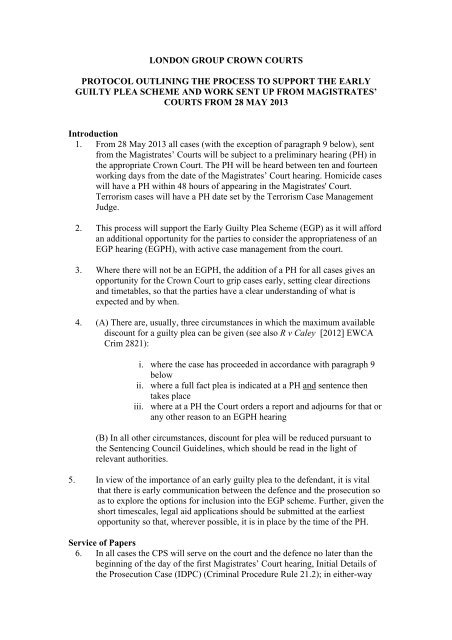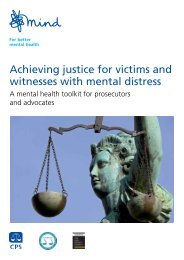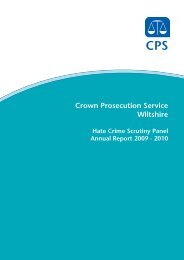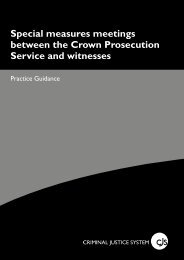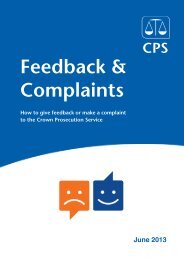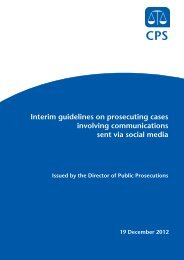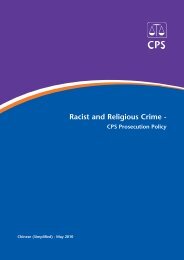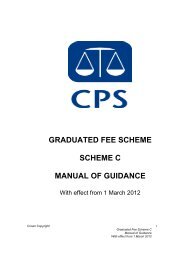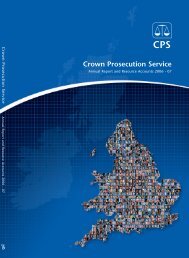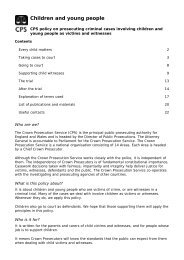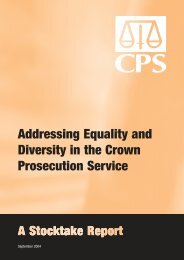london group crown courts protocol outlining the process to support ...
london group crown courts protocol outlining the process to support ...
london group crown courts protocol outlining the process to support ...
Create successful ePaper yourself
Turn your PDF publications into a flip-book with our unique Google optimized e-Paper software.
LONDON GROUP CROWN COURTSPROTOCOL OUTLINING THE PROCESS TO SUPPORT THE EARLYGUILTY PLEA SCHEME AND WORK SENT UP FROM MAGISTRATES’COURTS FROM 28 MAY 2013Introduction1. From 28 May 2013 all cases (with <strong>the</strong> exception of paragraph 9 below), sentfrom <strong>the</strong> Magistrates’ Courts will be subject <strong>to</strong> a preliminary hearing (PH) in<strong>the</strong> appropriate Crown Court. The PH will be heard between ten and fourteenworking days from <strong>the</strong> date of <strong>the</strong> Magistrates’ Court hearing. Homicide caseswill have a PH within 48 hours of appearing in <strong>the</strong> Magistrates' Court.Terrorism cases will have a PH date set by <strong>the</strong> Terrorism Case ManagementJudge.2. This <strong>process</strong> will <strong>support</strong> <strong>the</strong> Early Guilty Plea Scheme (EGP) as it will affordan additional opportunity for <strong>the</strong> parties <strong>to</strong> consider <strong>the</strong> appropriateness of anEGP hearing (EGPH), with active case management from <strong>the</strong> court.3. Where <strong>the</strong>re will not be an EGPH, <strong>the</strong> addition of a PH for all cases gives anopportunity for <strong>the</strong> Crown Court <strong>to</strong> grip cases early, setting clear directionsand timetables, so that <strong>the</strong> parties have a clear understanding of what isexpected and by when.4. (A) There are, usually, three circumstances in which <strong>the</strong> maximum availablediscount for a guilty plea can be given (see also R v Caley [2012] EWCACrim 2821):i. where <strong>the</strong> case has proceeded in accordance with paragraph 9belowii. where a full fact plea is indicated at a PH and sentence <strong>the</strong>ntakes placeiii. where at a PH <strong>the</strong> Court orders a report and adjourns for that orany o<strong>the</strong>r reason <strong>to</strong> an EGPH hearing(B) In all o<strong>the</strong>r circumstances, discount for plea will be reduced pursuant <strong>to</strong><strong>the</strong> Sentencing Council Guidelines, which should be read in <strong>the</strong> light ofrelevant authorities.5. In view of <strong>the</strong> importance of an early guilty plea <strong>to</strong> <strong>the</strong> defendant, it is vitalthat <strong>the</strong>re is early communication between <strong>the</strong> defence and <strong>the</strong> prosecution soas <strong>to</strong> explore <strong>the</strong> options for inclusion in<strong>to</strong> <strong>the</strong> EGP scheme. Fur<strong>the</strong>r, given <strong>the</strong>short timescales, legal aid applications should be submitted at <strong>the</strong> earlies<strong>to</strong>pportunity so that, wherever possible, it is in place by <strong>the</strong> time of <strong>the</strong> PH.Service of Papers6. In all cases <strong>the</strong> CPS will serve on <strong>the</strong> court and <strong>the</strong> defence no later than <strong>the</strong>beginning of <strong>the</strong> day of <strong>the</strong> first Magistrates’ Court hearing, Initial Details of<strong>the</strong> Prosecution Case (IDPC) (Criminal Procedure Rule 21.2); in ei<strong>the</strong>r-way
cases this will inform <strong>the</strong> decision in relation <strong>to</strong> allocation of trial. TheMagistrates’ Court must forward <strong>the</strong> IDPC <strong>to</strong> <strong>the</strong> Crown Court within fourworking days of <strong>the</strong> Magistrates’ Court hearing.Cases identified as suitable for EGP scheme at <strong>the</strong> Magistrates’ Court andagreed by <strong>the</strong> CPS and defence7. Cases coming before <strong>the</strong> Magistrates’ Courts will be reviewed by <strong>the</strong> CPS <strong>to</strong>establish whe<strong>the</strong>r <strong>the</strong> strength of <strong>the</strong> case is such that <strong>the</strong> CPS believes anEGPH is appropriate. Reports (a PSR) can be ordered by <strong>the</strong> Magistrates’Courts in such agreed cases, but only in line with <strong>the</strong> guidance at Annex A. 18. Where <strong>the</strong> Defence request an EGPH and no PSR is ordered <strong>the</strong> Magistrates’Court will fix an EGPH in <strong>the</strong> Crown Court (between ten and fourteenworking days time), indicating that <strong>the</strong> case has been identified as an EGPH.No PCMH date will be fixed.9. Where <strong>the</strong> defence request an EGPH and a PSR is ordered, <strong>the</strong> Magistrates’Court will fix an EGPH at <strong>the</strong> Crown Court approximately 4 weeks <strong>the</strong>reafter,as directed locally.Non EGP cases10. Unless a case is an agreed EGP matter (see above), <strong>the</strong> Magistrates’ Court willsimply set a date for a Preliminary Hearing in <strong>the</strong> Crown Court at a datebetween ten and fourteen working days from <strong>the</strong> date of <strong>the</strong> Magistrates’Hearing.Preliminary Hearings11. The PH will be conducted on <strong>the</strong> basis of <strong>the</strong> IDPC served at <strong>the</strong> Magistrates’Court and forwarded up (see paragraph 6 above). The CPS will bring anyadditional material <strong>to</strong> court. A draft Indictment will be brought inappropriate cases.12. The court will hear, inter alia, argument and submissions on <strong>the</strong> followingmatters:a. The court will take any Guilty Pleas offered, will resolve any issuesconcerning any basis of plea, and will ei<strong>the</strong>r sentence <strong>the</strong> matter or seta timetable for sentence, service of any fur<strong>the</strong>r prosecution materialand service of reports if appropriate. If a case is likely <strong>to</strong> be a GuiltyPlea, but fur<strong>the</strong>r evidence is required, an adjournment, ordinarily for 2weeks, for service of this material will be granted, subject <strong>to</strong>representations <strong>to</strong> <strong>the</strong> court where more time is required.b. Where <strong>the</strong>re are no guilty pleas and <strong>the</strong> matter is likely <strong>to</strong> proceed <strong>to</strong>trial, <strong>the</strong>n <strong>the</strong> court will give orders <strong>to</strong> take <strong>the</strong> matter forward,including setting <strong>the</strong> PCMH and a trial date (taking in<strong>to</strong> account CTLtimescales where appropriate) and service of <strong>the</strong> prosecution case. It is1 See s. 156 CJA 2003.
important that <strong>the</strong> prosecution have as much information about witnessavailability as possible.c. Any bail application. Bail applications should be made on notice,<strong>the</strong> defence serving any application on <strong>the</strong> Court and <strong>the</strong> prosecutionpreferably at least four working days before <strong>the</strong> PH, but in any eventnot less than 2 business days before <strong>the</strong> PH (Criminal Procedure Rule19.7(2)(c).Timelines13. The following timelines will be in place in all London Courts, unlesso<strong>the</strong>rwise agreed on a case by case basis.EGP wherereportrequestedEGP whereno reportrequestedAll o<strong>the</strong>rcasesMagsHearing <strong>to</strong>PH4 weeks10-14workingdays10-14workingdaysPH <strong>to</strong>Papers /InitialDisclosurePapers /InitialDisclosure<strong>to</strong> DefenceCaseStatementDefenceCaseStatement<strong>to</strong> PCMHTotal6 weeks 4 weeks 1 week 13 weeks14. Once it has been established that <strong>the</strong>re is <strong>to</strong> be no guilty plea and that trial islikely, one of <strong>the</strong> main purposes of <strong>the</strong> PH is <strong>to</strong> identify cases which maybenefit from ei<strong>the</strong>r a shortened or a leng<strong>the</strong>ned timeline. Those caseswhich require little fur<strong>the</strong>r preparation may be allocated by agreement anaccelerated timeline through <strong>to</strong> an early trial. Those which will needextended timetables <strong>to</strong> allow more extensive than normal preparation (forinstance where forensic evidence is sought e.g. cell site etc or where fur<strong>the</strong>rdefendants are <strong>to</strong> be added through ongoing investigations) may be granted aleng<strong>the</strong>ned timeline. Cus<strong>to</strong>dy Time Limits will form <strong>the</strong> back drop <strong>to</strong> <strong>the</strong>setime tabling discussions and decisions.Forms15. The London Courts will conduct hearings and record <strong>the</strong> decisions and ordersmade at hearings on <strong>the</strong> forms prescribed by <strong>the</strong> Criminal Procedure Rulesand set out in <strong>the</strong> Consolidated Practice Direction. These are availableonline and will be available in courtrooms in hard copy format. The formsare <strong>to</strong> be ready for use, e.g. advocates will have completed <strong>the</strong> appropriateparts of <strong>the</strong> form before <strong>the</strong> start of a hearing.Preliminary HearingCrimPR Part 3 Crown Court Preliminary Hearing (PDF 210.6kb. 4 pages)
PCMHCrimPR Part 3 - Plea & Case Management Hearing (PCMH) form (PDF288kb. 12 pages)Case readiness checks16. Each court will decide in consultation with its appropriate CPS Unit anddefence community what mix of Trial readiness measures <strong>to</strong> employ. Eachcourt will decide when and which cases are called in<strong>to</strong> court for a Pre-trialReadiness Hearing (PTR). The prosecution and <strong>courts</strong> are expected <strong>to</strong> attendcase progression meetings, able <strong>to</strong> make progress on cases, in line with <strong>the</strong>agreed procedures.AnnexesAnnex A: Guidance on <strong>the</strong> need for reports and on ensuring <strong>the</strong>ir timely productionAnnex B: Sentence ReductionsAnnex C: Observations on communication between <strong>the</strong> parties
Annex A <strong>to</strong> <strong>the</strong> London Crown Courts Preliminary Hearing and Early GuiltyPlea Pro<strong>to</strong>colGuidance on <strong>the</strong> need for reports and on ensuring <strong>the</strong>ir timely productionThis guidance should be considered at magistrates and <strong>crown</strong> <strong>courts</strong> when ordering anEGP hearing.2. The following questions may assist <strong>the</strong> decision <strong>process</strong>. Is a report necessary at all? If a report is necessary should it be a PSR or an FDR? If a report is necessary has <strong>the</strong>re been a PSR or FDR on this Defendant in <strong>the</strong>last 12 months? If <strong>the</strong>re has been any report in <strong>the</strong> last twelve months is <strong>the</strong>re any need forei<strong>the</strong>r a fresh report or and update?3. To assist in answering <strong>the</strong>se questions <strong>the</strong> following fac<strong>to</strong>rs are set out.a. Wherever a Report has been written within <strong>the</strong> last 12 months, it willusually be appropriate <strong>to</strong> ask for a copy <strong>to</strong> be available.b. Where <strong>the</strong> Defendant has completed a previous prison sentence of morethan 1 year within <strong>the</strong> previous 12 months, it may be appropriate <strong>to</strong> ask for anFDR or stand-down report <strong>to</strong> consider response <strong>to</strong> post-release supervision.It will usually be appropriate <strong>to</strong> order a report where:(In some of <strong>the</strong>se cases, a recent report may be sufficient) The Defendant is 17 and under The Defendant is under 21 and is a first time offender/has not served a prisonsentence The Defendant falls <strong>to</strong> be assessed for “dangerousness” (Schedule 15 cases)It will not usually be appropriate <strong>to</strong> order a report in <strong>the</strong> cases where: The Defence have asked for report <strong>to</strong> assist in determining <strong>the</strong> “length ofsentence” Supply of Class A offences False passport/ID docs 3rd Strike Burglary Cultivation of Cannabis Offences in Breach of a Suspended Sentence Order where a Breach Report isavailable High Level Frauds (in excess of £100K) “Cus<strong>to</strong>dy inevitable” cases where dangerousness is not a consideration andDefendant is not under 18 (cf “length of sentence” cases)4. The timely preparation of reports, when reports are essential, is central <strong>to</strong> <strong>the</strong> EGPscheme. If ordered reports are not available at EGP hearing much of <strong>the</strong> benefit of<strong>the</strong> system is lost. Accordingly, when Magistrates’ Courts consider <strong>the</strong> need forreports <strong>the</strong>y should record <strong>the</strong>ir decision as "PSR"or "FDR" or "No Report”. Thiswill ensure, at later hearings, that it is clear that <strong>the</strong> court did indeed consider <strong>the</strong> need
for a report and what its decision was. In like manner CPS and Defence shouldassume a duty <strong>to</strong> assist <strong>the</strong> magistrates by ensuring that <strong>the</strong> decision is addressed andshould note <strong>the</strong>ir files. Where a report has been ordered, Defence solici<strong>to</strong>rs should bealert <strong>to</strong> check with and ensure that Probation has indeed been made aware of <strong>the</strong> needfor <strong>the</strong> report and that <strong>the</strong>y have <strong>the</strong> Defendants details. Solici<strong>to</strong>rs will also be awareof <strong>the</strong> ability <strong>to</strong> make representations <strong>to</strong> <strong>the</strong> appropriate Crown Court in any particularcase where a decision has been made that no report is required or where court has notbeen asked <strong>to</strong> make such a decision.
Annex B <strong>to</strong> <strong>the</strong> London Crown Courts Preliminary Hearing and Early GuiltyPlea Pro<strong>to</strong>colSentence ReductionsAs a result of <strong>the</strong> introduction of <strong>the</strong> EGP scheme <strong>the</strong> Sentencing Guidelines CouncilDefinitive Guideline for “Reduction in Sentence For a Guilty Plea” (hereafter <strong>the</strong>Guideline) will be applied as follows:(i) Any defendant who does not plead guilty at <strong>the</strong> EGP hearing or whocancels an EGP hearing but who pleads guilty at a later hearing willnot receive maximum credit for that Plea unless a successfulsubmission is made that <strong>the</strong> EGP hearing was not <strong>the</strong> first reasonableopportunity for <strong>the</strong> defendant <strong>to</strong> have pleaded guilty.(ii) There is a presumption that a plea of guilty at <strong>the</strong> EGP hearing is <strong>the</strong>first reasonable opportunity <strong>to</strong> enter a guilty plea and a one thirdreduction in sentence. Cases that are indicated as guilty pleas ei<strong>the</strong>rat <strong>the</strong> sending hearing or PH will qualify for one third reduction.(iii) The one third reduction may be itself be reduced <strong>to</strong> 20% where Para5.2 <strong>to</strong> 5.5 of <strong>the</strong> Guideline applies (The "overwhelming prosecutioncase" provision).(iv) The one third reduction may be affected by <strong>the</strong> considerations set outin Annex 1 of <strong>the</strong> Guideline. This Annex gives guidance as <strong>to</strong>identifying <strong>the</strong> “first reasonable opportunity for <strong>the</strong> defendant <strong>to</strong> haveindicated a willingness <strong>to</strong> plead guilty”, but must now be read in <strong>the</strong>light of R v Caley [2012] EWCA Crim 2821.(v) A plea of guilty at PCMH will receive a reduction of 25%. Later pleasof guilty will have lesser reduction see <strong>the</strong> Guidelines Paras. 4.1 <strong>to</strong> 4.3.
Annex C <strong>to</strong> <strong>the</strong> London Crown Courts Preliminary Hearing and Early GuiltyPlea Pro<strong>to</strong>colObservations on communications between <strong>the</strong> partiesThe experience of <strong>the</strong> EGP pilots is that early communication between <strong>the</strong> defenceand CPS is paramount. Thereafter, communications between all parties, includingprobation and <strong>the</strong> <strong>courts</strong> should be timely and, wherever possible, those individualswith responsibility for making progress should be identified at an early stage andeasily contactable. Where individuals are not named, <strong>the</strong>re must be robust methods ofcommunication in place, for example email inboxes must be moni<strong>to</strong>red regularly andcontact numbers kept up <strong>to</strong> date.The use of post, DX and <strong>to</strong> a lesser extent fax, requires post <strong>to</strong> be collected and sorted,for administra<strong>to</strong>rs <strong>to</strong> link correspondence <strong>to</strong> files and for files <strong>to</strong> be allocated forconsideration of <strong>the</strong> correspondence. Letters are more formal so take longer <strong>to</strong> draftand <strong>the</strong>re is a lack of certainty of receipt which encourages duplicate correspondence<strong>to</strong> be sent. Duplicate correspondence also has <strong>to</strong> be linked and <strong>process</strong>ed, wastingfinite resources and thus slowing <strong>the</strong> <strong>process</strong> still fur<strong>the</strong>r. In EGP cases, wheretimetables are demanding, slow, wasteful or ineffective communications will impede<strong>the</strong> scheme.The CPS will provide contact details at an early stage so that <strong>the</strong> defence can discuss<strong>the</strong> case prior <strong>to</strong> <strong>the</strong> PH taking place. The CPS will also allocate an office-basedCrown Advocate full-time <strong>to</strong> EGP cases. The most effective way of ensuring thatEGP cases are identified, that any essential evidence <strong>to</strong> facilitate a plea is ga<strong>the</strong>redand that any proposed bases of pleas are considered is for <strong>the</strong> defence <strong>to</strong> speak direct<strong>to</strong> <strong>the</strong> Crown Advocate by telephone.If <strong>the</strong> Crown Advocate cannot be contacted and/or where an audit trail is necessary<strong>the</strong> CPS would ask that secure email is used. Emails should be marked with <strong>the</strong>defendant’s name, <strong>the</strong> CPS URN and ‘Early Guilty Plea’ in <strong>the</strong> subject title. Pleasenote that agreement <strong>to</strong> use secure email will not be taken as agreement <strong>to</strong> receiveelectronic papers.The relevant telephone numbers and email addresses are as follows:XX Crown Court EGP scheme:EGP CPS Crown Advocate telephone: 020CPS SEM: (xxx location) cases: XX.digital@cps.gsi.gov.ukCPS SEM: (xxx location) cases: XX.Digital@cps.gsi.gov.ukLondon Probation Trust CCLO Tel: 020 Fax: 020EGPRequestsXXCC@London.Probation.gsi.gov.ukXX CC case progression telephone: 020XX CC case progression SEM: caseprogression@XX.<strong>crown</strong>court.gsi.gov.uk


